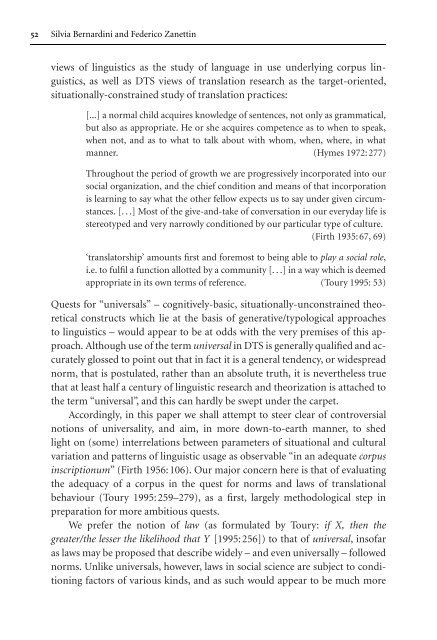Translation Universals.pdf - ymerleksi - home
Translation Universals.pdf - ymerleksi - home
Translation Universals.pdf - ymerleksi - home
You also want an ePaper? Increase the reach of your titles
YUMPU automatically turns print PDFs into web optimized ePapers that Google loves.
52 Silvia Bernardini and Federico Zanettin<br />
views of linguistics as the study of language in use underlying corpus linguistics,<br />
as well as DTS views of translation research as the target-oriented,<br />
situationally-constrained study of translation practices:<br />
[...] a normal child acquires knowledge of sentences, not only as grammatical,<br />
but also as appropriate. He or she acquires competence as to when to speak,<br />
when not, and as to what to talk about with whom, when, where, in what<br />
manner. (Hymes 1972:277)<br />
Throughout the period of growth we are progressively incorporated into our<br />
social organization, and the chief condition and means of that incorporation<br />
is learning to say what the other fellow expects us to say under given circumstances.<br />
[. . .] Most of the give-and-take of conversation in our everyday life is<br />
stereotyped and very narrowly conditioned by our particular type of culture.<br />
(Firth 1935:67, 69)<br />
‘translatorship’ amounts first and foremost to being able to play a social role,<br />
i.e. to fulfil a function allotted by a community [. . .] in a way which is deemed<br />
appropriate in its own terms of reference. (Toury 1995: 53)<br />
Quests for “universals” – cognitively-basic, situationally-unconstrained theoretical<br />
constructs which lie at the basis of generative/typological approaches<br />
to linguistics – would appear to be at odds with the very premises of this approach.<br />
Although use of the term universal in DTS is generally qualified and accuratelyglossedtopointoutthatinfactitisageneraltendency,orwidespread<br />
norm, that is postulated, rather than an absolute truth, it is nevertheless true<br />
that at least half a century of linguistic research and theorization is attached to<br />
the term “universal”, and this can hardly be swept under the carpet.<br />
Accordingly, in this paper we shall attempt to steer clear of controversial<br />
notions of universality, and aim, in more down-to-earth manner, to shed<br />
light on (some) interrelations between parameters of situational and cultural<br />
variation and patterns of linguistic usage as observable “in an adequate corpus<br />
inscriptionum” (Firth 1956: 106). Our major concern here is that of evaluating<br />
the adequacy of a corpus in the quest for norms and laws of translational<br />
behaviour (Toury 1995:259–279), as a first, largely methodological step in<br />
preparation for more ambitious quests.<br />
We prefer the notion of law (as formulated by Toury: if X, then the<br />
greater/the lesser the likelihood that Y [1995:256]) to that of universal, insofar<br />
as laws may be proposed that describe widely – and even universally – followed<br />
norms. Unlike universals, however, laws in social science are subject to conditioning<br />
factors of various kinds, and as such would appear to be much more
















